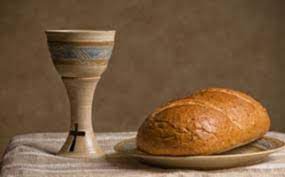December 10, 2021
We are coming off what I consider to be a banner stretch in our worship life: Holy Communion on five of the last six Sundays. This was good exercise for what I’d like to see become our pattern of sharing the Lord’s Supper on a weekly basis.
The custom at Grace for years had been communion twice a month, on the 1st and 4th Sundays; why that schedule, no one really knew. These past six weeks we had communion on Reformation, Oct. 31 (because we always do); then on the first and fourth Sundays of November (Nov. 7 and 28), and also the third (Nov. 21) which was Christ the King (because we always do). In the meantime we’d decided to shift communion Sundays starting in December to the more sensible schedule of the first and third of each month, so that gave us Dec. 5 also.
Every week would be even more sensible, considering the history and practice of Christ’s church on earth. Acts 20:7 tells us that the earliest Christian communities gathered on the first day of every week for the breaking of the bread. Late 1st and early 2nd century Christian leaders urged followers “on the Lord’s Day [Sunday] to come together, break bread, and hold Eucharist [“thanksgiving”].” Our 16th century Lutheran confessions affirm that “among us the Mass is celebrated every Lord’s Day and on other festivals.”
The main objection I’ve heard to weekly communion is that it makes the service longer. But let’s remember why we come to church the first place. We come not only to hear God’s Word read and proclaimed. We come not only to pray together and strengthen our faith through congregational song. We come to experience the sacramental presence of Christ in our midst and take him into our bodies, he who is mysteriously present “in, with, and under the elements” of bread and wine.
Why bread and wine? Because these are the basic substances of life. Containing elements of earth, air, water and fire, bread is produced skilled human hands as the main staple in human communities. Wine, the main festive drink, is the fruit of the earth also produced by skilled human hands. As these substances are consecrated in our communion liturgy, through the Holy Spirit’s power they come to consist of two realities, the earthly and the heavenly, that we take into our bodies. In this way the meal becomes a sacrament.
A sacrament is not just a symbol but a manifestation of that which is held under the guise of the symbol. In fact, all creation is sacramental, in that the universe “takes the form in which the beauty of God’s mind manifests itself.”[1] Think of a hug: It is not just a symbol of someone’s affection for you, but an expression which becomes part of you as you take that love into your heart. As the body and blood of Christ, bread and wine transformed, are taken into our bodies, we too are transformed as our faith is strengthened and we become better equipped for the hard work of discipleship.
I can only speak for myself in saying that I need all the strength and equipping I can get.
In Christ’s peace,
Pastor Raabe
[1] Kenneth Leech, True Prayer, Harper & Row 1980, p. 95.
